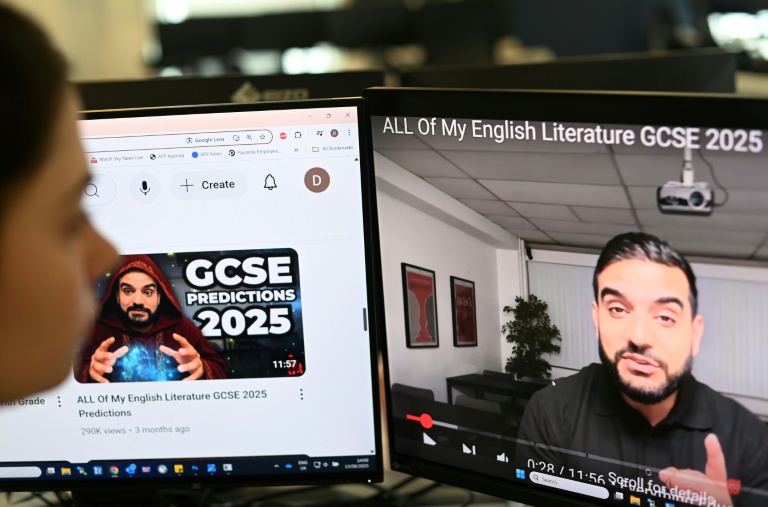Science
Stressed UK Teens Turn to Influencers for Exam Success

As exam season looms, many British teenagers are increasingly turning to social media influencers for guidance on achieving success in their upcoming assessments. Among these figures is former teacher Waqar Malik, who has gained significant traction on platforms like YouTube and TikTok. Malik, who presents himself as a fortune teller, claims he can predict exam questions for the General Certificate of Secondary Education (GCSE) in English literature, a major exam taken by students at age 16. His videos, particularly on his channel “Mr Everything English,” have attracted thousands of followers, with one prediction video alone garnering over 290,000 views.
Despite his growing popularity, educators express concern regarding the potential impact of influencers like Malik on students’ exam preparations. Sarah Brownsword, an assistant professor in education at the University of East Anglia, highlighted how alluring it is for students to receive direct advice from someone they follow online. “If you are a 15- or 16-year-old doing your GCSEs and you’ve got somebody in your phone who’s telling you ‘this is what the English exam is going to be about,’ that is so appealing,” she stated.
Many students have voiced their frustrations after the exam, with some claiming Malik’s predictions were inaccurate. Posts on social media expressed disappointment, with remarks such as “Never listening to you again bro,” reflecting a sense of betrayal among those who relied on his advice. As the results for the GCSE exams are set to be released on August 21, 2023, the exam board AQA has issued a warning regarding the increasing dependency on certain online revision channels, urging students to focus on their own interpretations of the texts studied rather than relying on external predictions.
Exam Pressure and Online Support
The pressure on students is palpable, with educators noting the overwhelming amount of content that needs to be revised across various subjects. Sarah Hannafin, head of policy for the school leaders’ union NAHT, commented on the situation, stating, “With so much content to cover and revise in every subject, it can be completely overwhelming. It is unsurprising that young people are looking for anything to help them cope.”
While some educators criticize the trend, others recognize the potential for online platforms to assist students in their studies. Brownsword emphasized the value of TikTok as an educational tool, noting that it allows students to access information on a wide range of topics. Yet, she cautioned against the risks associated with making predictions at such a large scale, particularly when influencers have significant followings.
Despite the criticisms, many content creators defend their approach to exam predictions. Tilly Taylor, a university student with a following of 100,000 on TikTok, insists her videos are meant to provide guidance rather than mislead. “I make it very clear in my videos that these are predictions,” she stated, mentioning that her content is based on past papers and reports from examiners.
Others, such as Ishaan Bhimjiyani, who has over 400,000 followers, have created educational influencer agencies to support fellow creators. Bhimjiyani argued that as long as content is marketed responsibly, there is merit in predicting exam topics. He promoted a site offering predicted papers for £1.99 (approximately $2.70) with a stated accuracy rate of 60-70 percent.
Community and Commercialization
Influencers like Primrose Kitten, a former teacher who charges £4.99 for an English predicted paper, see value in assisting students to prepare effectively for exams. “Predicted papers allow you to check whether you’re actually prepared for the exam,” she remarked, highlighting the potential benefits of such resources.
Bhimjiyani’s entry into the influencer space began when he started documenting his own study journey at the age of 16. “And then it kind of took off,” he recalled. Now, his agency represents over 100 bloggers in their mid-teens to mid-20s, with influencers commonly earning revenue through paid promotions for various brands, including educational resources.
Taylor, who transitioned from traditional education to online content creation, noted that she often relied on platforms like YouTube for study tips during her school years. “I wanted to help someone like myself, who couldn’t necessarily afford to go to private school or have private tuition,” she explained.
As the landscape of education continues to evolve, the intersection of social media and academic success raises both opportunities and challenges. The reliance on influencers for exam preparation reflects a shift in how students seek support in a highly competitive environment. As results day approaches, the true impact of this trend will become clearer, leaving educators and students to navigate the complexities of modern learning.
-

 Politics4 weeks ago
Politics4 weeks agoSecwepemc First Nation Seeks Aboriginal Title Over Kamloops Area
-

 World5 months ago
World5 months agoScientists Unearth Ancient Antarctic Ice to Unlock Climate Secrets
-

 Entertainment5 months ago
Entertainment5 months agoTrump and McCormick to Announce $70 Billion Energy Investments
-

 Science5 months ago
Science5 months agoFour Astronauts Return to Earth After International Space Station Mission
-

 Lifestyle5 months ago
Lifestyle5 months agoTransLink Launches Food Truck Program to Boost Revenue in Vancouver
-

 Technology3 months ago
Technology3 months agoApple Notes Enhances Functionality with Markdown Support in macOS 26
-

 Lifestyle3 months ago
Lifestyle3 months agoManitoba’s Burger Champion Shines Again Amid Dining Innovations
-

 Top Stories2 months ago
Top Stories2 months agoUrgent Update: Fatal Crash on Highway 99 Claims Life of Pitt Meadows Man
-

 Politics4 months ago
Politics4 months agoUkrainian Tennis Star Elina Svitolina Faces Death Threats Online
-

 Sports5 months ago
Sports5 months agoSearch Underway for Missing Hunter Amid Hokkaido Bear Emergency
-

 Politics5 months ago
Politics5 months agoCarney Engages First Nations Leaders at Development Law Summit
-

 Technology5 months ago
Technology5 months agoFrosthaven Launches Early Access on July 31, 2025













